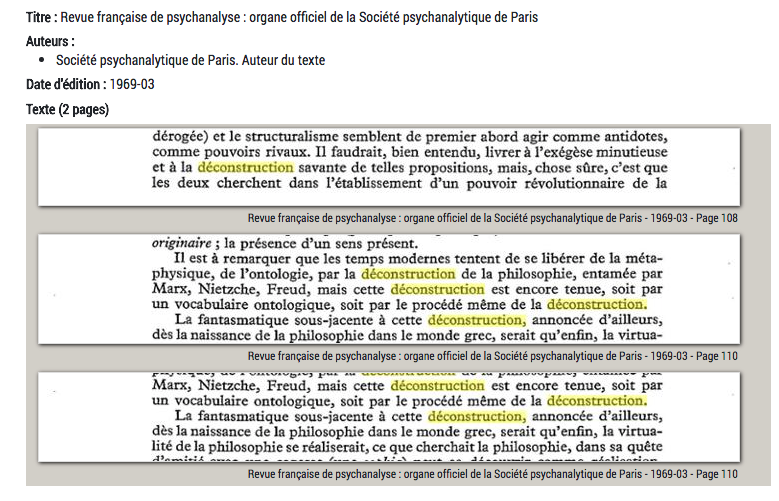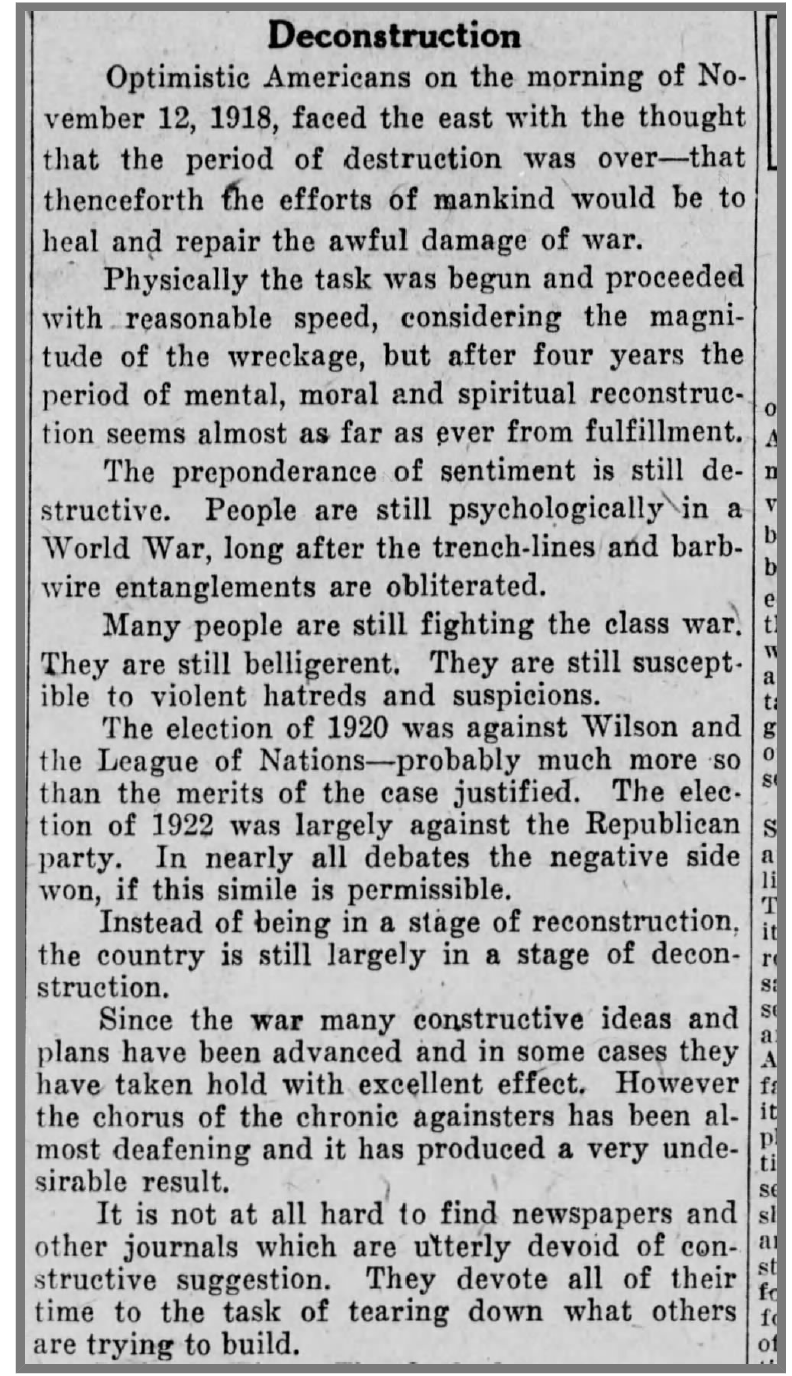Reconstructing deconstruction
« previous post | next post »
One of the most effective intellectual memes of the past century has been deconstruction — déconstruction in the original French. It recently occurred to me to wonder whether the word, as well as its interpretation, was created by Jacques Derrida, who introduced the contemporary usage in three works published in 1967: twice in La voix et le phénomène (along with two examples of the infinitive déconstruire), three times in L'écriture et la différance, and 14 times in De la grammatologie (along with six instances of déconstruire).
The French word déconstruction appears not to be found in the 8th edition of the Dictionnaire de l'Académie française (1932-1935), nor in the 9th edition (in progress). Nor is there any entry for the related verb déconstruire.
The OED has a single citation for the English word deconstruction, from 1882, for the sense "The action of undoing the construction of a thing":
1882 McCarthy in 19th Cent. 859 A reform the beginnings of which must be a work of deconstruction.
…and then nothing else until 1973, with the gloss "A strategy of critical analysis associated with the French philosopher Jacques Derrida (1930–2004), directed towards exposing unquestioned metaphysical assumptions and internal contradictions in philosophical and literary language":
1973 D. B. Allison tr. J. Derrida Speech & Phenomena vi. 74 The prerogative of being cannot withstand the deconstruction of the word.
…or in the original context
Mais comme son sens ne désigne rien, aucune chose, aucun étant ni détermination antique, comme on ne le rencontre nulle part hors du mot, son irréductibilité est celle du verbum ou du legein, de l'unité de la pensée et de la voix dans le logos. Le privilège de l'être ne peut pas résister à la déconstruction du mot. Être est le premier ou le dernier mot à résister à la déconstruction d'un langage de mots.
According to Wikipedia,
Le terme de déconstruction apparaît chez Jacques Derrida pour la première fois dans l’œuvre De la grammatologie sans traduire explicitement des termes heideggeriens. Derrida expliqua qu'il souhaitait « entre autres choses » proposer une traduction pour les termes allemands de Destruktion et Abbau, que Heidegger emploie dans Être et Temps ; Jacques Derrida estime cette traduction plus pertinente que la traduction classique par destruction, dans la mesure où il ne s'agit pas tant, dans la déconstruction de la métaphysique, de la réduire au néant, que de montrer comment elle s'est bâtie.
« Tous les deux signifiaient dans ce contexte une opération portant sur la structure ou l’architecture traditionnelle des concepts fondateurs de l’ontologie ou de la métaphysique occidentale. Mais en français le terme « destruction » impliquait trop visiblement une annihilation, une réduction négative plus proche de la « démolition » nietzschéenne, peut-être, que de l’interprétation heideggerienne ou du type de lecture que je proposais. Je l’ai donc écarté. Je me rappelle avoir cherché si ce mot « déconstruction » (venu à moi de façon apparemment très spontanée) était bien français. » — Derrida, Psyché. Inventions de l'autre, p. 338
En réalité, le mot déconstruction est apparu dès 1955 dans le contexte de la philosophie française à l'occasion de la traduction du texte de Heidegger Contributions à la question de l'être (Zur Seinsfrage). Gérard Granel a choisi ce terme pour traduire le mot allemand Abbau qu'il voulait distinguer du mot « destruction » (traduction de Zerstörung).
The term deconstruction appears in Jacques Derrida's work for the first time in Of Grammatology without explicitly translating Heideggerean terms. Derrida explains that he wanted "among other things" to suggest a translation for the German terms Destruktion and Abbau, which Heidegger uses in Being and Time; Jacques Derrida finds this translation more appropriate than the classic translation destruction, in the sense that the deconstruction of metaphysics is not reducing it to nothingness, but rather showing how it is built.
"In this context both mean an operation bearing on the structure or traditional architecture of foundational concepts of western ontology and metaphysics. But in French the term "destruction" implies too clearly an annihilation, a negative reduction more like Nietzschean "demolition", perhaps, than like the Heideggerean interpretation or the type of reading that I was suggesting. Therefore I removed it. I recall having investigated whether this word "deconstruction" (which came to me in an apparently very spontaneous fashion) was actually French." — Derrida, Psyché. Inventions de l'autre, p. 338
In fact, the word deconstruction has appeared since 1955 in the context of French philosophy due to the translation of Heidegger's text Contributions to the Question of Being (Zur Seinsfrage). Gérard Granel chose this term to translate the German word Abbau, which he wanted to distinguish from the word "destruction" (translation of Zerstörung).
So either Derrida elided his debt to Granel, or followed the same path independently to the same end.
The BNF digital library Gallica has no (genuine) instances of déconstruction earlier than this 1965 architectural reference in the Revue de la Haute-Auvergne:
… leurs voûtes ont beaucoup souffert, non seulement parce que les toits on été endommageés par les « déconstructions » de flèches ou clochers, mais encore parce que la charpente a été ruinée par défaut d'entretien, …
… their vaults have suffered greatly, not only because the roofs have been damaged by the "deconstructions" of spires or bell towers, but also because the framework has been ruined by lack of maintenance, …
It's not clear why the author chose to use this neologism in scare quotes — perhaps this was a person who had attended some of the structuralism/phenomenology debates of the 1960s, in which Derrida might have tried out his invention/borrowing?
After 1967, Gallica finds several unquoted uses in psychoanalytic writings:
And
What about in English? Google Books doesn't have the OED's 1882 citation "A reform the beginnings of which must be a work of deconstruction", other than in works on literary theory quoting the OED entry. Nor does Google Books have any instances of deconstruction before 1967 (other than a dozen quotes from periodicals that are misdated, as Google Books so often does, to the first publication date of the series).
But newspapers.com has quite a few examples of apparently genuine older instances of the word deconstruction. Some are apparently typographical errors or malapropisms for "reconstruction", e.g. this example from the St. Cloud (Minnesota) Times, 1/29/1932, which is evidently a reference to the "Reconstruction Finance Corporation":
However, there are a number of other examples that are clearly witting neologisms, like this passage from the Wichita (Kansas) Beacon, 12/9/1922:
So the creation of a new word by combining the latinate morphemes de- and construction has clearly happened more than once, and perhaps we should declare Derrida innocent of failure to cite prior work. (Though his ideas about citation seem to imply that no one can really be guilty of this offense…)





AntC said,
April 28, 2018 @ 5:31 pm
As a result of a series of earthquakes in Christchurch NZ in 2010, 2011, large numbers of the buildings were rendered unfit for purpose. Many of them were deemed unsafe to enter, for fear of collapse in the aftershocks.
What word to use for what was to happen to them? 'Demolished'? 'Pulled down'? 'Destroyed'? No. The word that was used was 'deconstructed'.
For historical buildings, this meant trying to rescue the timber, paneling, fixtures and fittings. But most buildings were standard concrete and steel multi-storeys.
Day after day as monster machines delicately munched the concrete into rubble from the top down and the inside out (so that the walls collapsed in on themselves), I reflected on what Derrida would have made of it all.
J.W. Brewer said,
April 28, 2018 @ 6:07 pm
I like the idea of seemingly-novel Parisian innovations in fact having been anticipated decades earlier in Wichita.
Apparently "Abbau" is commonly (not sure I have enough info to say "typically") rendered as "dismantling" by English translators of Heidegger not self-consciously deferential to his French translators. I don't know French, so I can't say if existing words in that approximate semantic space such as "démantèlement" or "démontage" might have been adequate to render the Heideggerian notion into French without the need for a neologism. Once you have the French neologism and there's an English neologism (that happens to be spelled the same once you lose a diacritical mark or two) that seems to match, it's probably too late to go with a comprehensible pre-existing English word that adequately translates a French word that Derrida could have used but chose not to.
Jim Breen said,
April 28, 2018 @ 6:21 pm
The absence in the Dictionnaire de l'Académie française is interesting, but perhaps not surprising. I just checked in our (1993) Le Nouveau Petit Robert and both déconstruction and déconstruire have entries.
Arthur Waldron said,
April 28, 2018 @ 6:40 pm
I always tell my students never to permit a word of which you are unsure to join your discussion without checking its papers. Thank you for this illuminating example of how this is done. Whether this new locution adds any value I am not sure.
Jean-Sébastien Girard said,
April 28, 2018 @ 7:58 pm
The Académie dictionnary is not exactly known as a contemporary, or even a very good dictionary. It's usually about 25 years behind.
I think the reason that the word was scare-quoted in the Revue de la Haute-Auvergne is that there's a longstanding approach to neologism in French, and France in particular. Namely, neologism are at least suspicious, or by default wrong to use. It stems back from the 17th century when the literati basically declared french perfect and immutable. Once you do that, then any sort of neologism contradicts this and is to be ruthlessly criticized (in practice I think the neologizing criticism has typically be used as a cover up for other criticisms).
[(myl) But 1967 was 51 years ago, so 25 years has passed twice over.]
Bill said,
April 28, 2018 @ 11:13 pm
There's a use in "Practical specifications of works executed in architecture, civil and mechanical engineering" from 1865 on Google Books: "He shall be empowered to require the immediate deconstruction and re-execution to his satisfaction of any such work as may appear to him to have been executed improperly…"
[(myl) Thanks! Here's a link to the book: Practical specifications of works executed in architecture, civil and mechanical engineering. For some reason, Google Books doesn't find this passage for me even if I search for the full quote that you provided, though it does find the book if prompted by the title.]
tk (PhD) said,
April 29, 2018 @ 5:35 am
In re: “. . . until 1973 . . . ‘A strategy of critical analysis . . . exposing unquestioned metaphysical assumptions and internal contradictions in philosophical and literary language.’”
I have to admit that I have never read any Derrida, nor any of the other post- whatevers, so whatever notion of the term I gleaned was by osmosis. That said, while a graduate student (1977-86), I found myself asking, “what did those people [earlier scholars] mean by that (word/phrase)?” {e.g., what did J. W. Powell mean by “regimentation”?} My intention was not to expose any “unquestioned assumptions” or “contradictions,” merely to try to understand what the words meant to those guys and why they were writing such things..
So, minus the Derrida’s political implications, this post is a fine example of my use of “deconstruction” to deconstruct déconstruction.
Arthur Waldron said,
April 29, 2018 @ 7:56 am
Tk. As they say in the Navy you cracked the code. And spared yourself much scut work. These “texts” will not be “revisited”. Collegial good wishes. arthur
languagehat said,
April 29, 2018 @ 8:22 am
So either Derrida elided his debt to Granel, or followed the same path independently to the same end.
Are you assuming that Derrida, like Granel, used it to translate Abbau as opposed to Destruktion? Because that's not clear to me from the quotes you provide.
[(myl) No — but the concepts and issues are similar, and the neologism is the same, which Derrida explicitly calls an invented translation for "les termes allemands de Destruktion et Abbau". So it's odd for Derrida to describe the word déconstruction as "venu à moi de façon apparemment très spontanée", given that Granel had used it just a few years earlier in translating one of the same German words in the work of the same author.]
There's a use in "Practical specifications of works executed in architecture, civil and mechanical engineering" from 1865 on Google Books
It actually occurs twice, on p. 47 (l. 7 from end) and p. 48 (first line).
My intention was not to expose any “unquestioned assumptions” or “contradictions,” merely to try to understand what the words meant to those guys and why they were writing such things.
It's not clear to me whether you are putting Derrida down or just pointing out that you were doing something different, but Arthur Waldron seems to assume the former and heartily agree, with that jovial Anglo-Saxon call-a-spade-a-spade approach that the French find so simple-minded. I'm no partisan of Derrida — I tried to read his stuff back in '79-'80 when it was so fashionable (I worked in a bookstore with a heavy academic focus, since it was in a college town) and even sat in on one of his lectures (which was surprisingly comprehensible), but could make no headway — but to think you can dispose of an entire body of intellectual argument by talking about "what the words meant to those guys" would be fatuous. I mean, surely even an Anglo-Saxon can see things aren't that simple.
Arthur Waldron said,
April 29, 2018 @ 10:21 am
Glad I am hearty. Yes I am more influenced by the English school.
Grains of truth are to be found in nearly all scholarship. So I put no one down. I think Abbau is probably the root here. But my grasp of Heidegger is weak. Can anyone outline the philosophy and the philology? best to all Arthur